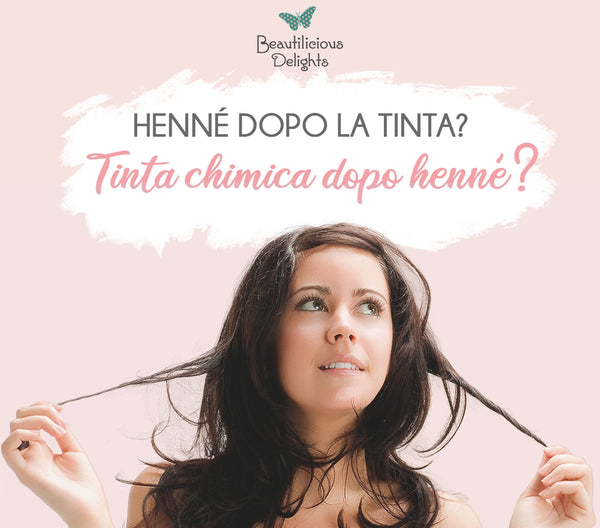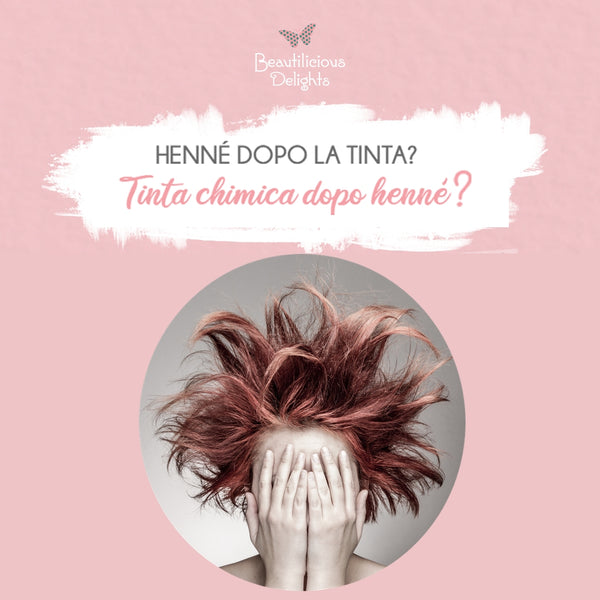One of the recurring doubts in those approaching henna and herbal dyes for the first time is whether they can use henna on previously chemically dyed hair.
Or again, should you not like the shade obtained with dyeing herbs, if it is possible to use a chemical dye to take cover after using henna .
Well today, I will try to answer all these doubts.

What differentiates henna from hair dyes?
The main difference between henna and traditional hair dye is how they color your hair:
-
the pigment of the henna and of the dyeing herbs clings to the stem and therefore adds up to the starting color
While
-
the chemical tint , simplifying a lot, creates a basic environment to open the cuticles of the stem and replaces the natural pigment with a synthetic pigment also allowing in this way to obtain lighter shades, which for obvious reasons, is not possible using the henna.
If you want to learn more about the various types of chemical hair dyes and how they act on the stem, you will find a detailed study in this article: Hair dyes without chemicals: a mirage?
Do you love to change your hair color often?
A first assessment that I advise you to make is if you love to change the color of your hair often. If so, I discourage you from starting to use henna and herbal hair dyes and later you will also understand why.
If you have a thin and fragile stem , you will have already noticed the devastating effects that chemical dyes and especially bleaching have had on your hair. It is above all the type of fine, thin and fragile hair that gains the greatest benefits following the applications of henna and herbal dyes which, by layering on the stem, in the long run, strengthen the stem.
If, on the other hand, you are lucky enough to have inherited a robust and thick stem and you like to change shades often because even if the stem is damaged it is not so noticeable as in the case of thin hair, think carefully before choosing henna as a natural alternative for coloring your hair because it will limit you a lot later, when maybe you will want to go back to playing with the shade of your hair.
In a nutshell, based on the dyeing mix or dyeing herb you choose to use , you may no longer be able to bleach / lighten your hair , otherwise it will cause strange reflections.
In addition, the lawsonia once used does not go away because its pigment, the lawsone, binds with the keratin present in the stem and as much as it can discharge over time, the warm shade of the lawsonia will always be noticed, especially on the lighter hair.
If you therefore prefer to change your hair color frequently, I do not recommend using herbal dyes.
But now let's go step by step and see what you need to evaluate first when you want to use henna and herbal dyes on chemically dyed hair .
The shade you want to achieve with the henna makes all the difference
Is the shade you obtained with the chemical dye on the lengths lighter than your natural regrowth and do you want to replicate the same light shade with henna?
Unfortunately dyeing herbs can't marry your needs because they don't lighten your hair but their pigment adds up to the starting color . So by applying them to your darkest regrowth, their pigment will add up to your natural color and not make it any lighter.
Is the shade you want to obtain with henna and herbal dyes similar to or darker than your natural color and the color obtained with hair dye?
In this case you can use henna and herbal dyes without problems on your chemically dyed hair even 1 week after the last hair dye.
The only precaution is that you must make sure that the dye powders you are going to use are pure and not reinforced with chemical additives or picramate.
If you don't know what henna with picramate is, I have dedicated an article here on the blog.
To summarize in a nutshell:
- Picramate is added to lawsonia inermis to strengthen the coloring power of the vegetable pigment and enhance the red and at the same time to reduce the processing time to 20-30 minutes.
- It is enough to read the INCI to understand if the lawsonia you choose contains picramate or not.
Find out in this article how to read the INCI and what it tells us about the product
Henna with picramate after the chemical dye?
However, if your choice falls on a dyeing powder with added picramate and your hair is chemically dyed, remember to always do an allergy test first and a test test on a hidden strand to check how the stem reacts and if you get strange reflections .
Personally I would advise you to avoid dyeing herbs reinforced with picramate because it is not predictable how your chemically treated or bleached stem will react.
All the dyeing herbs you find on our. shop online are 100% pure and do not contain any type of added synthetic substances.
Does henna take on chemical dye?
Absolutely yes, you can use henna and herbal dyes on chemically dyed and/or bleached hair.
Remember to always start by carrying out the test on a hidden lock to avoid dramatic consequences.
Attention: Hair that has been bleached and chemically lightened to obtain streaks and highlights is much more porous and will absorb much more pigment than healthy hair, therefore a test is essential.
In this particular case there is the need to re-pigment the stem to avoid ending up with a green crown but I will talk about this in a future article.
Replicate your natural hair color (medium/dark brown/black) with henna and herbal hair dyes
If your desire is to replicate your natural color with herbal dyes while coloring white hair, then everything is much simpler.
Whether you have lighter lengths (light or coppery brown) or already brown (medium or dark brown), you can easily replicate the same color even on your white regrowth.
In this article: Cover white hair naturally with henna and herbal dyes I share with you my journey into the universe of herbal dyes and how I got a dark brown with henna and herbal dyes on my white regrowth (more than 80% currently ).
Replicate your light shade (blonde or light brown) with henna and herbal hair dyes
This is slightly more complicated and not always feasible.
It must always be evaluated from case to case because the difficulty consists
-
both in the fact that the herbal dyes do not lighten the hair
-
both in the fact that some dye mixes applied on light lengths (chemically treated or not) could give strange, greenish reflections.
Again, the life buoy is the proof test that once again proves to be essential.
*************
Let's take as an example a mane with ash blonde regrowth and chemically colored blonde lengths. The risks you run with herbal dye mixes could be the following:
- the detachment between regrowth and lengths remains
- the color could change to coppery (this depends on the dye mix used)
- the lengths could take on strange, greenish reflections (this depends on the dye mix used)
Can I do chemical dye after using henna?
To reply to those who write to me if it is possible to switch to chemical coloring after using henna, also in this case there are several cases to consider.
This question concerns both those who have been using henna for years and for whatever reason intend to switch to chemical hair dye, and those who would like to start using herbal dyes but are afraid of not feeling well and therefore wanting to go back to chemical coloring.
The general answer is yes, but it could also become a big NO depending on the shade you want to obtain.
Have you only had one application of henna and herbal dyes and for the most varied reasons do you want to go back to using chemical dye?
Yes, you can dye after using henna as long as you do-
you have used pure herbal dyes and not reinforced with chemical additives or picramate
-
you are chemically dyeing the same shade and not trying to lighten.
Have you decided to use hair dye after using herbal dyes for years?
Also in this case it will be "safer" and with predictable results to use a chemical dye on hair treated with a dyeing mix of henna and herbal dyes that is close to the shade you want.
***********
For example, it is relatively easy to obtain a dark brown with chemical dye on hair treated with a dye mix of Lawsonia and Indigo (a mix that allows you to achieve a brown shade).
In this regard, you will find this study interesting and useful: Does brown henna exist? Get a brown color on your white hair
On the contrary , it will be almost impossible to obtain a lighter shade with a chemical dye than that obtained with henna and herbal dyes.
************
For example, you will not be able to obtain a blond starting from a copper or a chestnut because the red will tend to emerge anyway.
In this case, my advice is to carefully evaluate the possible consequences of using herbal dyes on your hair in order to avoid disappointment if you think that one day you might want to go back to using chemical dyes or want to bleach them.
In a nutshell, those who want to use henna as a natural alternative to chemical dyes will have no difficulty using it if they want to obtain a similar or darker color than that obtained with traditional chemical dyes.
Instead, henna may not be the right solution for those who want to maintain a light color on naturally dark hair, which can easily be achieved with chemical dye.
In any case, before switching from henna to chemical dye or from chemical dye to henna , my advice is to always do a trial test.
Find out how to do it in the 2 guide videos: Preparation and application of henna and herbal dyes: The Complete Guide
© Beautiful Delights
In the online shop you will find everything you need (including herbal dyes) to take care of your skin and hair in a conscious way. Click HERE to visit it!
************************************************** ************************************
Keep in touch with us:
Follow us on SOCIAL by clicking on the icons below to stay up to date on the latest news:
Rozalia & the Beautilicious Delights Team.




